
25 minute read
School News
Last October, Jyodee Sannnassy Pilly, PhD researcher from the School of Ocean Sciences joined REV Ocean and OCEEF to explore the twilight zone on of the most remote reefs in the Central Indian Ocean.
Jyodee in Omega submersible observing her first Tinselfish at 500m in central Indian Ocean

Omega submersible at 500m starting video transect in central Indian ocean
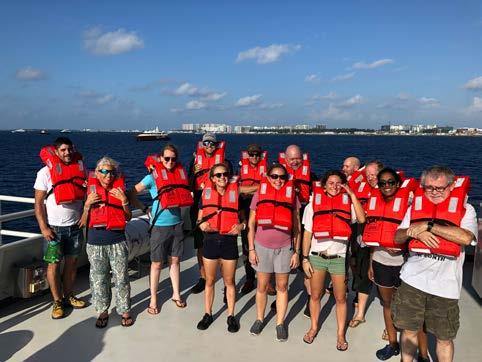
REV Ocean team with scientists from Bangor University, Plymouth University and Oxford University Jyodee participated in this first deep-sea mission in the Chagos Archipelago in two Triton submersibles, where they conducted daily dives to document the seafloor and fish communities to at least 500m deep.
Jyodee’s research in the archipelago focuses on depth zonation in shallow coral reef communities and their changing structure due to climate change. This expedition gave her the opportunity to see the reefs as well as observe potential indirect anthropogenic impacts on the ecosystem below diving depths. Using state-ofthe-art video and sampling equipment on the submersibles, the team were able to collect data on hard coral, fish, seaweed, soft coral and echinoderm populations from 60 – 500 m deep across the archipelago. While providing early career scientists like Jyodee training in deep water ecology and conservation management, the data generated from this expedition will provide a better understanding of the unique deep-sea ecosystem of the central Indian Ocean.
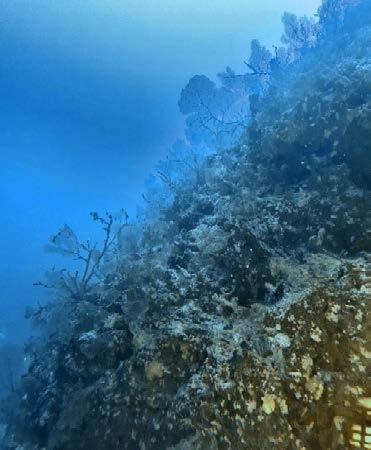
Glimpses of the reef structure at 250m and 120 m in Central Indian Ocean

A few months ago, 4 current students and 1 recent student attended the International Seabird Conference on 22-25 August in Cork, Ireland.
Claire Carrington and Sophie Crouch presented their PhD research, Rhys Gadd presented his MRes research, and Orla Van der Noll presented her MSc research. Natalie Robinson was also in attendance, providing opportunities to discuss her MRes research with peers. Whilst she unfortunately couldn’t attend, Eleanor Falch MRes research was presented by her peers. Aside from attending the presentations, all students benefited greatly from the Early Career Research Events which the Seabird Group conferences are renowned for.



Congratulations to INSITE PhD student Sophie Crouch whose poster presentation received a ‘highly commended’ award at the International Seabird Conference in Cork (22-25 August) and then the ‘best poster’ award at the Environmental Impacts of Marine Renewables (EIMR) conference (4-6 October).
Sophie’s research focusses on impacts of offshore wind on seabirds and marine mammals in the North Sea and is supervised by Simon Neill, Matt Lewis, and James Waggitt.

Giulia Cecchi, from Italy, a 2nd year BSc student in Marine Biology and Oceanography here in Ocean Sciences recently gave a presentation at the WEEN conference (Welsh Ecology and Evolution network).
This an annual student-led conference aiming to create a networking platform for early-career scientists at Welsh Universities. She gave a speed talk on the natural variability of tidal mixing fronts. The topic is part of SHEAR, a NERC funded project at Bangor University focusing on the impact of the physical environment on the foraging energetics of shearwaters and the consequences for breeding success.
The UK Challenger Society and biannual Challenger Conferences are named after Charles Darwin’s 1872 HMS Challenger expedition and exists to bring together UK marine scientists and international colleagues to discuss the latest science and inspire new generations of ocean researchers.
This year the biannual Challenger Society Conference marked the 150th anniversary of the Challenger expedition and celebrates the birth of international and interdisciplinary oceanography with the meeting held at the Natural History Museum in London.
The conference brought together over 400 scientists to take stock of where marine science has arrived at in UK, as well as providing the opportunity to consider the future of open, international, collaborative, inclusive and diverse marine science

Congratulations to Bangor University Physical Oceanography PhD student Katie Sieradzen on winning the Challenger Society Cath Allen Prize at conference. Katie’s poster described her ENVISION PhD research into the impact of tidal mixing on shelf sea flushing times in a global climate model.
Katie’s poster was selected for the prize from over 100 posters at the conference. The Prize is named in honour of Bangor alumni Cath Allen, who studied for a PhD on shelf sea fronts with Prof John Simpson in the 1980s before passing at a tragically young age in 1991. Cath came to Bangor to study for her PhD having undertaken a BSc and MSc at Liverpool University. Following completion of her PhD she took up an academic position at Lancaster University.
Amongst the keynote speakers at the conference were Professor Gary Carvalho, Emeritus Professor of Molecular Ecology here at Bangor University, where his research has focused on employing genetic markers to address major questions in ecology and evolution.
The Challenger Society and Bangor University
The biannual Challenger Society conference series started in Bangor in 1984. The first conference was held at the School of Ocean Sciences in the (now demolished) Westbury Mount Lecture room, abit a squeeze for the 120 delegates! It was organised by John Simpson, along with Steve Thorpe (then at Southampton), Paul Linden (Cambridge) and Roy Chester (Liverpool) with important jobs like operating the slide projector (this was before overheads!) taken on by Bangor PhD students including Ed Hill (now head of the National Oceanography Centre and Bill Turrell (now head of Environment Monitoring and Assessment Programme with Marine Scotland Science). Other Bangor participants included PhD student Meg O’Hara who made the most of the location of the conference in the Natural History Museum to check out some of the exhibits!


Jennifer Hewitt, Darbyshire Award for Best BSc Student in Marine Physical Oceanography

PROF CRAIG KENSLER STUDENTSHIPS
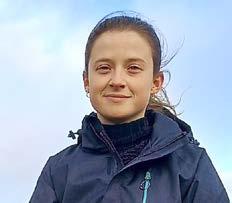
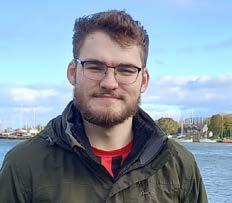
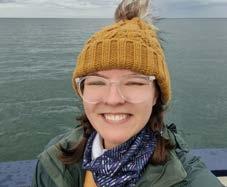
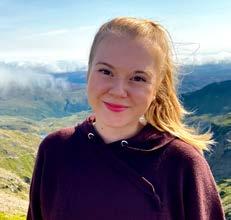
Ruth Wills Applied Marine Biology Hi I’m Ruth and I have been at Bangor University for the past 4 years studying Applied Marine Biology. I am a grateful recipient of the Professor Craig Kensler studentship, which I will be using for a MscRes researching the population biology of dab in our local waters. I will be using data collected from the RV Prince Madog’s annual fishing trips to investigate the current population biology of dab. I have almost 25 years of data to work with, so I will be able to see how population biology has changed over time, and how a change in mesh size in the fishing gear has affected size and abundance of catch.
Simon Wills
Hi, my name is Simon, I’m from Shropshire, and this year I will be doing an MScRes on parasites in UK cephalopods. I’ll be identifying and counting parasites in cephalopod tissue, as well as measuring and weighing cephalopod specimens. I also will be trying to refine the techniques involved in the histological process of parasite ID in cephalopods, as it is quite nuanced. I’m really enjoying the year so far, and greatly look forward to learning and applying more knowledge and techniques throughout the year.
Amy Ewing
Only one semester into my MSc in Applied Marine Geoscience, and I’m already in love with all the course has to offer! As Secretary of Bangor University’s Mountain Walking Club, an avid climber, and a general mud-and-sand enthusiast, I’ve always wanted a future career which will take me into the great outdoors rather than tethered to a desk. I really feel my MSc has given me a taste of that freedom! On the RV Prince Madog, I had the opportunity to assist in the acquisition of real-world data, from the refined information of a MBES, to the primitive sediment grabber, and I couldn’t be more grateful for the opportunity.
Francesca Fehlberg
My name is Francesca, and I am currently studying on the MSc Marine Environmental Protection course. I am extremely grateful to have recently received the Craig Kensler studentship to support my further studies. This studentship has encouraged me to become more self-confident and has motivated me to step outside of my comfort zone. I feel that this award has recognized my strong work ethic along with the many hours and hard work I have put into my studies since starting at Bangor University in 2019. It has made me determined to continue to pursue my dream of undertaking a PhD and becoming a recognised, and well-established female scientist in STEM. Additionally, I am thankful to have also received the Society for Underwater Technology’s Educational Support Fund to further support my educational goals. I couldn’t have achieved either of these awards without the encouragement and support of Bangor University and the professors I have worked with whilst undertaking my studies and work experiences in Wales, England, Switzerland, Iceland and Germany.
Last year, having received the support of the Santander mobility grant, I was able to work as a Field Assistant on the Red Kite project based in Fribourg Switzerland, for the Swiss Ornithological Institute. Furthermore, I was lucky enough to be chosen to be part of the team that, after 140 years, reintroduced the first two Bearded Vultures back into the National Park of Berchtesgaden, Bavaria, Germany. In summer 2022, I was awarded the BES Ecology Resources Ltd. Bursary which enabled me to work as a Lead Technical Assistant on the Skylark Project, conducting drone surveys to determine more ecologically beneficial agricultural practices, in Bern, Switzerland. After a long wait, in July 2022 I was finally able to join James Waggitt on a Eurofleets research ship to Iceland, studying the energetic landscape of seabirds which was spectacular. All of these experiences have allowed me to consistently grow and broaden my outlook in professional environments and have Ied to me being able to take part in an important research project, focusing on critically endangered farmland birds - Corn Buntings, for my dissertation. Currently, I am preparing my manuscript for publication, and I am very excited to have had my research findings presented at the Corn Bunting Conference in Brussels. None of this would have been possible without the amazing staff at Bangor University and I am incredibly grateful for this support in my both my professional and academic careers. I am looking forward to the next new adventure and would encourage everyone to follow their goals, as you never know where you are going to end up next.
Bangor University well positioned in new sustainability rankings
The first QS World Sustainability Rankings - designed to measure the way universities are responding to the global Environmental, Social and Governance challenges - have ranked Bangor University in the 181-190 range, out of 700 institutions internationally.
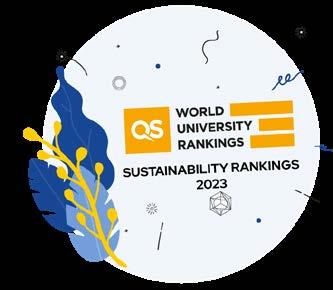
This places us in the top 26% of institutions that have been ranked by QS. In the UK, Bangor is ranked 28th out of 68 institutions.
Universities are ranked in two categories, that each contribute 50% to the overall institutional ranking: Environmental Impact and Social Impact. Bangor has been ranked 98th globally, and 19th in the UK, for Environmental Impact. For Social Impact we are ranked 414th globally, and 51st in the UK.
A number of performance indicators make up each category, and our best relative performance is for Sustainable Education where we have achieved a top 30 global position, and a top 10 position in the UK.
Dr Sinclair Buchan 1936-2022
It is with great sadness that we report the death of a highly-respected and long-serving staff member of the School of Ocean Sciences.
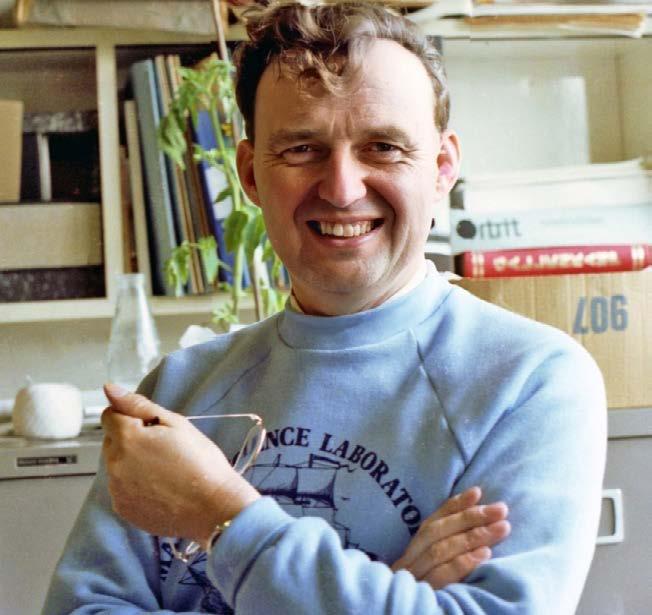
Sinclair Buchan worked at ‘the labs’ in Menai Bridge for nearly 40 years. He enjoyed his role as a teacher and he loved to get to know his students, delighting in their various characters. In 2014, with George Floodgate, he established the School of Ocean Sciences Association in order to maintain links between The School and its graduates. Even after his retirement, Sinclair regularly attended graduation ceremonies and he kept in touch with many of his former students with Christmas Cards full of hand-written news.
Sinclair was born and grew up in the fishing port of Fraserburgh in the north-east of Scotland. He was an active young man, keen on football and cycling. He would tell you that he had cycled abroad – to England! As a young man, he played for Fraserburgh football club. Buchan was a common name in the area and, for a while, the whole team had the surname of Buchan. One year, Fraserburgh did well in the Scottish Cup and were drawn away to a first division team – one that had a PA system at the ground, a rarity in those days. The crowd roared as the team ran onto the pitch and the announcer called their names: number 1, Buchan, number two, Buchan...
Sinclair studied mathematics and geography at Aberdeen University and began his working life on the trawling fleet in his home town. Docking one day after a fishing trip in the early 1960’s, he was told of a job that might suit his interests and qualifications, in far-away Menai Bridge. At that time, you could travel by train to Menai Bridge Railway Station, which was near the Antelope pub. When Sinclair arrived, the station porter let him use the staff room to smarten up. It had been a long and tiring journey and he relied on his wits to get through the interview. He got the job.
To begin with, Sinclair’s role was as a researcher, working with George Floodgate with whom he developed an enduring friendship. He carried out fundamental research on suspended sediments in coastal waters, work which is still relevant today. As the student body at the Marine Science Laboratories grew, Sinclair’s lecturing duties took up more of his time. He was a versatile teacher, running courses in soil science and geotechnics at undergraduate and postgraduate level. Most students passing through Bangor, though, would first come across Sinclair on his famed meteorology course, the highlight of which was the fabled field trip up Snowdon. This field course lasted a full week, coach loads of students being bussed to Llanberis every day. There would be a brief stop at Bangor pier to ‘zero the altimeters’ and it was at this point that Sinclair would divide the class into groups – the better dressed and shod being given the more challenging higher stations on the mountain. Weather conditions on Snowdon at Easter could still be wintry. Sinclair remembered one group of Malaysian students, who had never seen snow, struggling to hold their whirling anemometers to measure the wind speed in a blizzard. Another, hardy, group at one of the top stations carefully measured the lake temperature as 2 degrees Centigrade before stripping off and taking a swim in the water. An annual event that Sinclair revelled in was the Marine Management symposium. This was a two-night residential course at Gregynog in mid-Wales. Students gave talks about managing the resources of the sea and there was plenty of opportunity for staff and students to chat together over meals and in the bar. Sinclair liked to treat his personal tutees to a ‘wee dram’ on these occasions. After the Gregynog bar had closed, the wee drams multiplied themselves into the night. Remarkably, Sinclair was always bright-eyed the next morning although some of his tutees were not so keen on their breakfast the next day. Sinclair’s engagement with his classes was legendary. It meant that his name was carried far and wide as his students found employment around the country – and indeed the world. One story tells of a former Bangor student turning up to register at the dole office in Aberdeen. The official behind the encounter went through his form and when he came across the fact that the applicant had studied at Bangor he looked up and asked ‘And did you come across a Sinclair Buchan?’. Sinclair never found out who that official was.
Sinclair’s natural good humour and positive attitude made him a well-liked – loved, even – member of the university. He was a reliable and kind colleague with a wise head on his shoulders. He was good company, with a dry sense of humour and a fine selection of stories. There is a word that is not so very often used today but it is appropriate on this occasion, nevertheless. Sinclair Buchan was a gentleman. Early in his time at Bangor, Sinclair struck up a friendship with a fellow Scot who was going out with a nurse from the Caernarfon and Anglesey Hospital. When a mutual friend was visiting from Scotland, Sinclair asked the nurse if she could bring a couple of colleagues along to make a party for a night out. That’s how he met Sarah, whom he married soon afterwards. Sinclair and Sarah had a son, Andrew, who tragically died while still a young man.
Sinclair was a keen golfer, squeezing in a few holes at Bangor’s course whenever his lecture timetable allowed. He was an active member of St Deiniol Golf Club for many years, as a player and administrator. He carried on playing after retirement, working on his handicap and was proud to say that he played with a group who were mostly aged in their 80’s – except for those who were in their 90’s. He was also keen on do-it-yourself and kept his house in Bangor immaculate inside and out. His golf, DIY, interest in whisky and communicating with his old students kept him happily busy almost to the end. Text by Dave Bowers; photo supplied by Keith Wevill.
To honour Sinclair’s memory we have set up a fund to support an undergraduate student award. If you would like to contribute please do so via: https://www.bangor.ac.uk/giving/how-to-give
Prof. Alice Newton (Marine Biology & Oceanography, 1981 / Marine Biology MSc 1987)
“It was with great sadness that I learned that Sinclair Buchan has died. He was my teacher in the first year of my undergraduate course (1978), but more importantly, he was my tutor. I started attending his classes and had quite a struggle understanding him, as I was more familiar with foreign accents than regional accents. I sat next to a Scottish student which helped, as I could look at their notes. Sinclair was a spirited lecturer with animated gestures, so there was no dozing off!
A few weeks into the first term, I was hospitalized, in the old C and A hospital, which became a supermarket. I was quite seriously ill and on painkillers that kept me sedated and I was not very aware of my surroundings. There were no mobile phones and my contact with my parents was through letter writing. Since it was the first year, I had not yet made the lifelong friends that I made later at UCNW. So no-one knew that I was in hospital.
Sinclair was a busy scientist and lecturer, but he realised that one of his tutees was ‘missing’. He inquired from the other lectureres, the students, at the residence, he asked around and finally he contacted the hospital, where he found me. He came to visit and was hugely supportive. He got lecture notes from the other lecturers and helped me catch up on the missed lectures. I was always grateful to him and have never forgotten. When one of my students ‘disappears’ I always track down what is going on. Sinclair taught me that being a tutor is an important part of University life. I am not a whisky drinker, but everytime I see someone with a single malt, I think of Sinclair, and always will.”
Rick Nunes-Vaz (PhD, physical oceanography 1982) Sad news of Sinclair. He was a lovely character at the labs and I’m sure I wouldn’t have enjoyed it there nearly as much if he hadn’t got me involved in the meteorology practicals, including on Snowdon.
The love for Sinclair amongst former students is clearly evidence from comments from our Facebook page following Sinclair’s passing, a few of which are reproduced here:”
So sorry to hear this. Sinclair’s meteorological lectures were legendary and memories of these stay with me to this day...
Jim Pyrah
I am so very sorry to hear this - Sinclair was an inspiration throughout my 3 years at SOS and we remained in contact ever since after my graduation. In his initial lectures in meteorology - I barely understood his accent but he was always kind enough to go through the notes again. Also introduced me to ‘cullen skink’. Loved his wicked sense of humour. Rest in peace Sinclair
Pui-Leng Tay
I’m not sure who coined the phrase “The Menai Bridge Mafia” for all those of us who have gone into the offshore industry but Sinclair certainly played a pivotal role in leading us to follow that route. I’ve wonderful memories of Sinclair and Jack Darbyshire when I did my M.Sc. back in 69-70.
Colin Charley
I’m so sad to hear this news of Sinclair Buchan’s passing. He was the first person I spoke to from SOS - I had dropped a grade and called Bangor to see if I could take my insurance place. He was so friendly and reassuring that any upset I had from receiving a terse response from my first choice just melted away! These things happen for a reason, and I’m glad I didn’t end up doing three years of geophysics at a different Uni! After graduation, Sinclair and I remained in contact on Facebook, where we had a yearly check in when we wished each well on our shared birthday! I have very fond memories of Sinclair: dragging us up Snowdon for the meteorological field trip on a dreary day (John Roach, Jon Rollinson, Martin Drabble, Christian Thompson, Tarik Hassan, Ken Chan, Ashley Shilton; Matt Sydenham); panicking trying to get all the info from the Shipping Forecast down; a huge group of us lining up whiskies in the Gregynog bar to see if we could get him drunk, only to see him striding out for his morning walk whilst we were all dying in our rooms (Caroline Culshaw!). What a man! What a legend! One of my favourite lecturers. I’ll miss him. Much love to his family and friends.
Alix Cage
To all our graduating students of 2020, 2021 and 2022

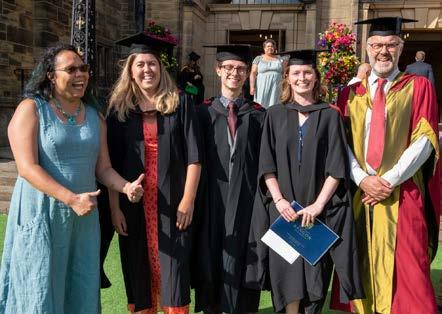


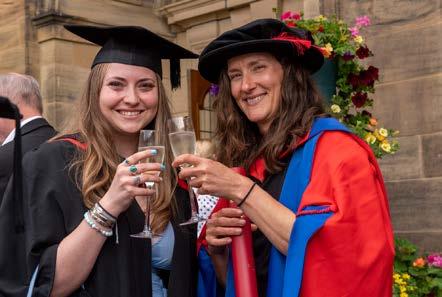

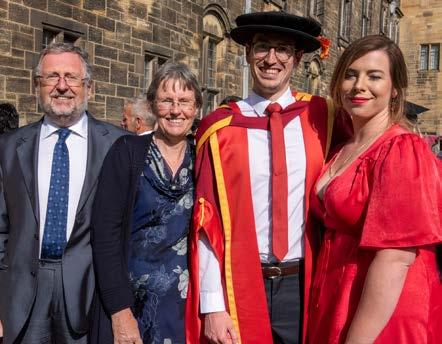
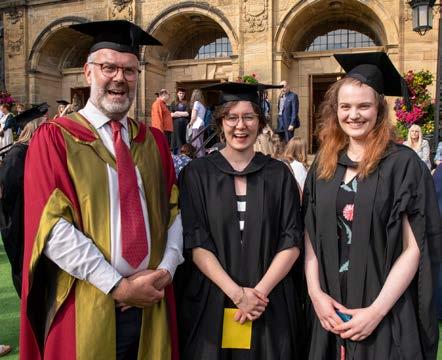

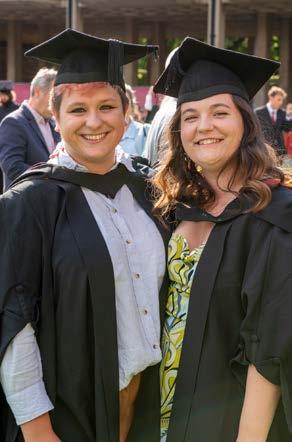
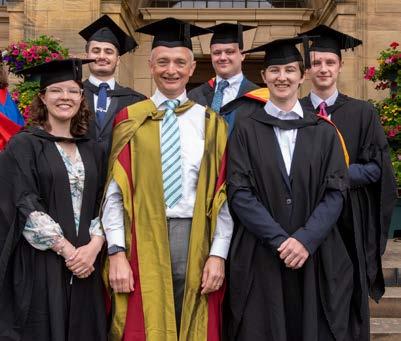






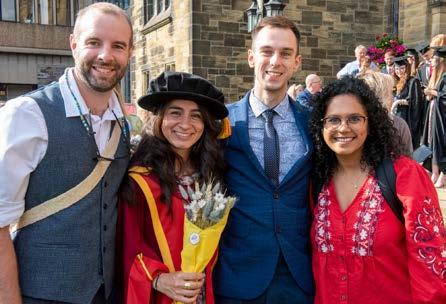

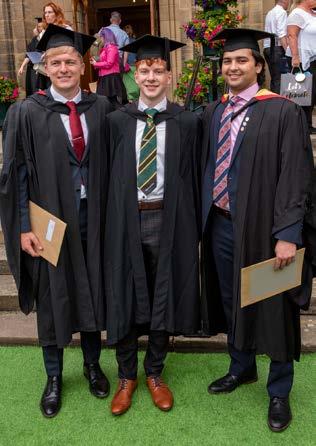
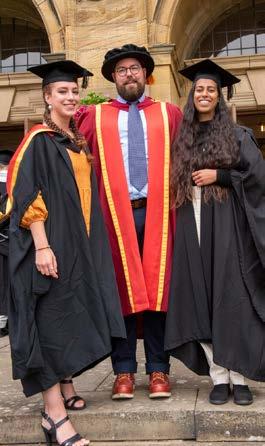
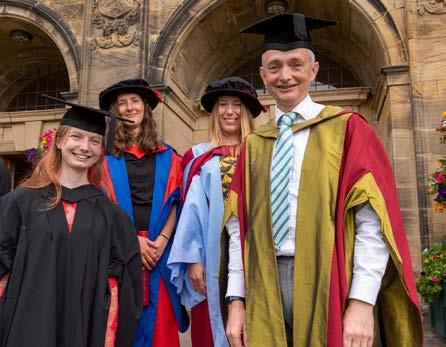
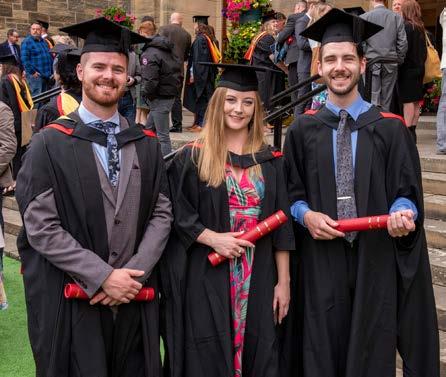
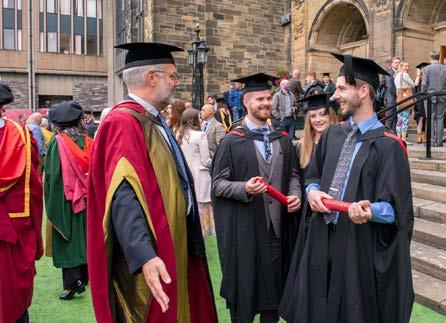

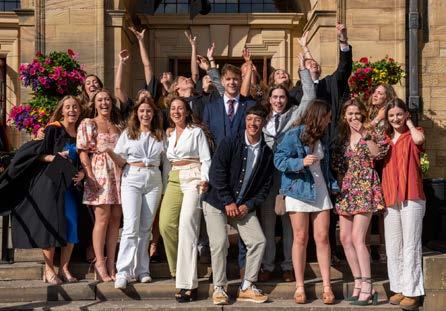


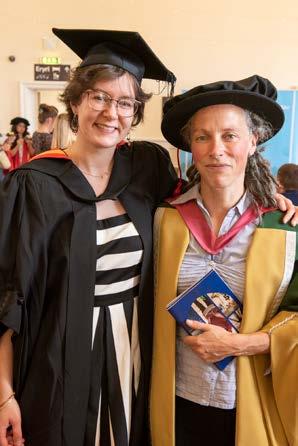
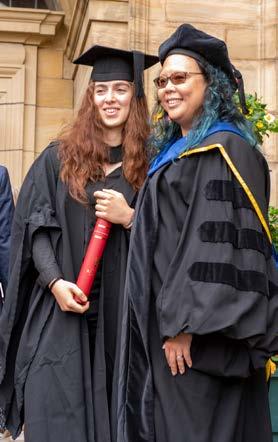
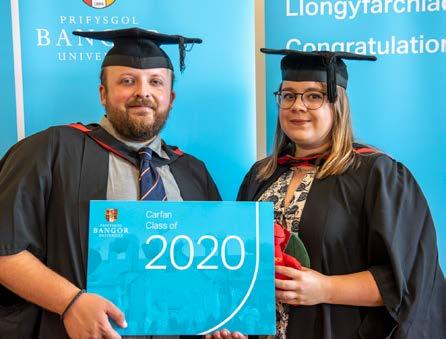
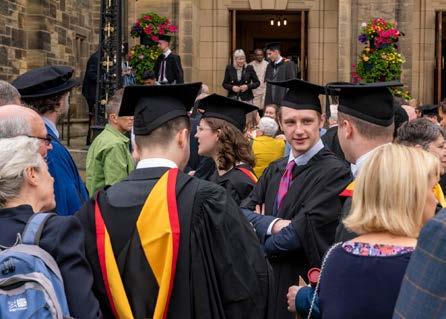



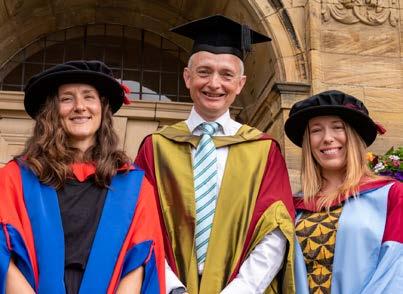
To Laura Grange, Sarah Zylinski and Dei Huws on being awarded Bangor University teaching scholarships at this summer’s graduation. To Marine Biology and Oceanography graduate Zaha Waheed on her award on an honorary degree by Bangor University. Zaha is currently a minister in the Government of the Maldives and visited Bangor to receive her degree this summer. You can find out more about Zaha’s career from the Winter 2021/22 edition of the Bridge.
To TV wildlife star and Bangor Zoology and Conservation graduate Hamza Yassin on being awarded an honorary degree at this summer’s Ocean Sciences graduation and on his sterling performance on Strictly Come Dancing!
To Yueng-Djern Lenn on being awarded the American Geophysical Union Cryosphere Division John F Nye Lecture honour. The honour is presented annually and recognizes recent accomplishments and outstanding ability to present exciting scientific research and findings. Yueng was nominated for this honour by Professor Sheldon Bacon of the National Oceanography Centre (UK), Professor Mary-Louise Timmermans of Yale University (US) and Professor Ilker Fer of Bergan University (Norway).
To Antonio Hoguane, who studied Physical Oceanography and Mathematics as an undergraduate at Bangor and then completed (in 1997) a PhD supervised by Ed Hill has followed in Ed’s footsteps by being appointed Director General of his nation’s Oceanographic Institute. The appointment was made by the Prime Minister of Mozambique who is seen here with Antonio (who is on the right).


To Brian Scannell on his appointment as an honorary lecturer. Brian is a Bangor Ocean Electronics graduate who ‘retired’ back to Menai Bridge to complete an MSc and then PhD in Physical Oceanography. His research interests include using state-ofthe-art acoustic doppler current profilers to measure turbulence parameters.
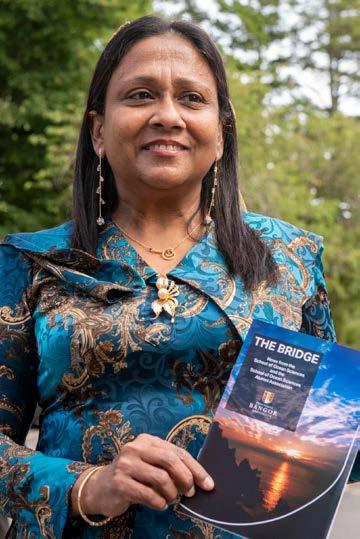

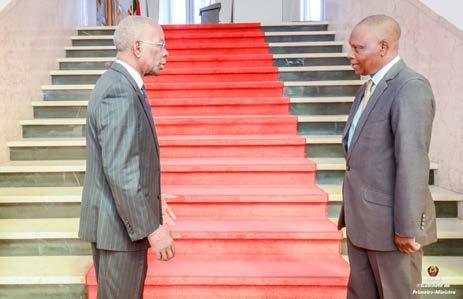
Dr Natalie Hold who has been appointed to a lectureship in Marine Biology.
Natalie gained an MSc in Marine Environmental Protection at Bangor University in 2008 with a research project on the population genetics of the Caribbean spiny lobster in the western Antilles going on to complete PhD in 2012 which focused on the connectivity and spatial structure of the scallop fishery around the Isle of Man, funded by the Isle of Man Government. The project involved surveys on the research vessel Prince Madog as well as collaboration with stakeholders including fishermen and processors. Work included population genetics of scallops around the Isle of Man and across the wider European range, statistical modelling of environmental and anthropogenic drivers of spatial variation in scallop reproductive status and modelling of the impact of hatchery reared scallop seed on wild populations.
Her Post-doctoral research at Bangor University (2012-2015 and 2019- present) has focused on inshore, data poor, shellfish fisheries across Wales, requiring active engagement with the fishing industry for collaborative data collection. All research aims are closely aligned with fisheries management and policy evidence requirements in order to deliver meaningful research to impact sustainable fisheries management. A key framework for our sustainable fisheries research is to provide evidence for the management of key commercial fisheries within the Ecosystem Approach to Fisheries Management (EAFM), ensuring that single species approaches (such as stock assessment and single species reference points) are complemented with wider ecosystem evidence such as appropriate spatial scales, adjacent effects and longterm effects.
She also spent three years working as a fisheries scientist for a consultancy (2016-2019) working on a range of projects including environmental baseline studies for energy developments, intertidal aquaculture developments and coastal realignment schemes. she worked in collaboration with fishers and statutory conservation agencies to develop fisheries management plans for several order fisheries and to carry out annual stock status surveys on the fishery.
She is currently the project manager for the EMFF sustainable fisheries in Wales project. As well as project management she is the lead researcher for the component of the project using our long-standing relationships with the industry to develop innovative technology for maximising high quality, high resolution fishery-dependant data collection.
Dr Innes MacCarthy who joins the School of Ocean Sciences as research fellow in Marine Archaeology.
Innes has a long career of exciting shipwreck discoveries. These include the wreck of HMS Indefatigable, sunk at the Battle of Jutland. Innes has worked in collaboration with Dr Mike Roberts of CAMS in the identification of 273 shipwrecks surveyed by the Prince Madog over the years including a number of submarines, including U-87 reported in the Summer 2020 edition of the Bridge. Many of Innes discoveries are documented in his new book, Echoes of the Deep, which is featured in this newsletter.
Dr Gary Caldwell, a Senior Lecturer in Applied Marine Biology at Newcastle University, who gave a research seminar in the School in October.
Gary is Bangor University Marine Biology graduate and his main research interests cover algae biotechnology, chemical ecology, ecotoxicology and marine venoms.








